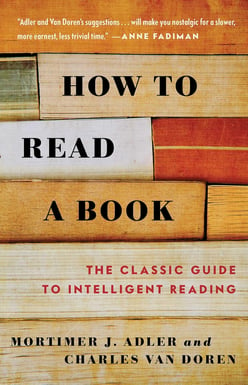Exploring the Depths of Reading: Insights from "How to Read a Book" by Mortimer Adler
LITERATURE


In an era dominated by rapid information consumption, Mortimer Adler's "How to Read a Book" remains an enduring compass for unraveling the true essence of reading. Originally published in 1940, this profound work transcends mere decoding of words; it offers a philosophical exploration of the art of reading and its transformative capacity.
Adler challenges the passive approach to reading, advocating for an active and engaged method. He delineates four levels of reading: elementary, inspectional, analytical, and syntopical. Mastering these levels, he contends, empowers readers to unlock the full depth of knowledge and wisdom concealed within the pages of a book.
Here are key insights gleaned from "How to Read a Book":
Beyond the Surface: Move beyond a superficial understanding of the text. Delve deeper to discern the author's primary arguments, underlying assumptions, and potential biases. Actively question the text, employ critical thinking, and cultivate informed opinions.
Comprehension Over Speed: Resist the temptation to speed through pages merely to reach the book's conclusion quickly. Instead, adopt a slower pace, revisit essential passages, and take notes to solidify comprehension.
Purposeful Reading: Approach each book with a specific goal in mind. Whether seeking knowledge on a particular topic or aiming to enhance critical thinking skills, identifying your purpose guides the reading process and enriches the learning experience.
Active Engagement: Interact with the text by taking notes, posing questions, and drawing connections to your own experiences and knowledge. This active participation transforms the reading experience, making it more enjoyable and meaningful.
Diverse Exploration: Expand your horizons by reading widely and diversely. Move beyond familiar genres and authors to explore different perspectives, challenging pre-existing beliefs and broadening your understanding of the world.
"How to Read a Book" extends beyond a mere reading guide; it serves as a compass for learning, thinking, and personal growth. By integrating Adler's insights into your reading practice, you unlock a profound appreciation for literature, acquire valuable knowledge, and develop into a more critical and informed individual.
So, pick a book, embark on this journey of active reading, and reveal the hidden potential within its pages.


